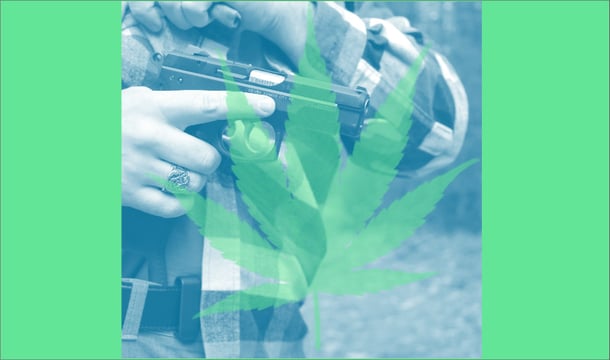There are 23 states that have some form of allowance for medicinal marijuana enacted. That means possession of marijuana alongside some card will not subject that person to state-level prosecution so long as that person is within the bounds of that state law. But how can owning firearms and being in possession of legal amounts of cannabis affect you as a concealed carrier?
Well, as it turns out, it can affect you a lot.
The Difference Between “Immune From State Prosecution” And “Immune From Prosecution”
For instance, in 2008, Michigan passed a law making it legal for medical prescription of cannabis. This means that the Michigan state courts can not prosecute on that basis. However, that person is not immune from Federal courts which still see marijuana as a Schedule I drug.
Inane? You bet. But until the Federal government formally orders the Drug Enforcement Agency (DEA) to remove marijuana as a Schedule I drug, it can be prosecuted at the Federal level.
Even while there is pressure mounting to remove cannabis as a Schedule I drug, the DEA is staunchly standing by its listing — making its permanent removal a completely ridiculous political cluster-bunch.
More importantly, the Bureau of Alcohol, Tobacco and Firearms (BATF) enforces all measures within its jurisdiction — in this case, firearms particularly. Whenever a firearm is purchased through a vendor with a Federal Firearms License, a part of the National Instant Background Check System (NICS) asks a particularly hairy question:
“Are you an unlawful user of, or addicted to, marijuana or any depressant, stimulant, narcotic drug, or any other controlled substance?”
Source: BATF Form 4473
If you say “no” and you use cannabis or cannabinoid products, that would theoretically be perjury in the eyes of the Federal government. If you say “yes”, the FFL vendor has a legal obligation to deny the sale of the firearm.
States Still Working Out Cannabis Kinks
A lot of states have had real issues with determining how their legalization of medical marijuana impacts otherwise law-abiding concealed carriers. In Seattle, Washington — one of the first states to legalize recreational marijuana use — one concealed carrier was denied because of her prior history with medical marijuana.
via KOMO News
[The Concealed Carry applicant] Floyd had no problems with any question on the application, except when it came to question number five, which asks, “Are you an unlawful user of, or addicted to, marijuana?”
“I answered it ‘no’ because how I read it is, are you an ‘illegal user’ or addicted to marijuana, and I don’t feel I’m either,” Floyd said.
That’s when something unusual happened. Floyd was asked to provide her medical marijuana authorization card.
“An employee recognized me and she asked me to attach my medical license on my application,” she said.
With nothing to hide, Floyd says she obliged. A couple of weeks later, she got her application back in the mail. It was denied.
And, again, in Illinois — concealed carry applicants got a rude awakening when they were sent supposedly erroneous letters from the state requesting they surrender their firearms based upon their medical marijuana status.
It reflects a reality that many concealed carriers do not want to face: the states really don’t know how to operate in this new gray zone of state-legalized/federally-illegal drug law. It’s unfortunate because many millions of Americans turn to the use of cannabis to treat ailments and improve quality of life.
In this meantime when concealed carriers are uncertain about their status, applicants are urged to closely examine their state’s laws to ensure they are in compliance with both the state and the federal government.







![[WATCH] Man Attempts To Abduct Barista Through Drive-Thru Window](https://imagedelivery.net/sbm_lYeJbALkepJgtmRD5w/concealednation.org/2023/02/barista-surveillance-footage.jpg/w=728,h=381)
![Self Defense? Armed Protester With AK-47 Shot And Killed By Armed Motorist In Austin [VIDEO]](https://imagedelivery.net/sbm_lYeJbALkepJgtmRD5w/concealednation.org/2020/07/ScreenHunter_3610-Jul.-26-13.30.jpg/w=728,h=381)




![[VIDEO] Double Barrel 1911 VS Ballistic Gel](https://imagedelivery.net/sbm_lYeJbALkepJgtmRD5w/concealednation.org/2015/07/ScreenHunter_119-Jul.-24-17.32.jpg/w=728,h=381)
